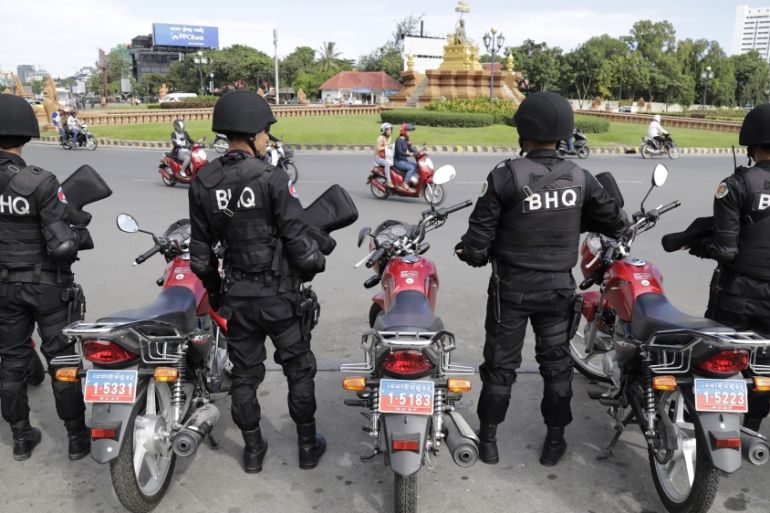Cambodia detains another opposition member amid crackdown
Rights group calls for dropping of charges and release of Nuth Pich, a member of the dissolved opposition party.

Phnom Penh, Cambodia – A Cambodian opposition figure, Nuth Pich, was arrested last week in what is seen as an intensifying crackdown on the political opposition by the government of Prime Minister Hun Sen.
Nuth Pich, a former district official for the court-dissolved Cambodia National Rescue Party (CNRP), was arrested on August 17 in Kampot province while he was harvesting rice at his farm, his son Pun Theany told Al Jazeera on Wednesday.
”When the police came to my father they asked him if any plot of land was for sale,” Pun Theany said.
“He said there was no land for sale here, and after that they just arrested him without giving any reason or showing any arrest warrant.”
|
|
Pun Theany said the police treated his father unfairly and brutally.
“They handcuffed him, pushed him to the ground, and took him to the district police [office] barefoot,” he said.
Pun Theany said the family has not been allowed to visit his father since he was arrested.
Al Jazeera has learned that Choung Choungny, who often represents politically-sensitive cases, was named as Pich’s lawyer on Thursday.
Nuth Pich had been organising gatherings of opposition supporters.
Since the beginning of 2019, the authorities have summoned over 147 CNRP members and supporters around the country for questioning, according to Human Rights Watch (HRW).
On May 7, the police had arrested another former Kampot provincial CNRP official, Nget Khouch, and held him for two nights, the HRW reported.
The CNRP was dissolved in November 2017 for allegedly plotting to topple the Cambodian government with the support of the United States, although little evidence has been offered to substantiate the accusation.
Then-president and cofounder of CNRP, Kem Sokha, remains under house arrest since September 2017 on a treason charge.
The dissolution came after the CNRP’s strong showing in the 2017 local commune elections, where they won 43 percent of the popular vote.
Threat to Hun Sen
Seen as a threat to Hun Sen’s 34-year grip on power, the party was dissolved before the 2018 national election, turning Cambodia into a de facto one-party state.
Most of the leadership has fled the country, while local activists face arrests, beatings, intimidation, and even death.
|
|
According to a court order viewed by Al Jazeera, Nuth Pich has been charged with discrediting a judicial decision and incitement to commit a felony, facing up to two and a half years in prison.
Justice Ministry spokesman Chin Malin said Nuth Pich “violated the law” by continuing to work on “activities of the dissolved party” but refused to comment in detail on the charges.
In a statement on Tuesday, HRW condemned the arrest as “politically motivated” and called for charges to be dropped.
“Cambodian authorities went into contortions to find charges to bring against Nuth Pich, who merely exercised his basic rights to free speech and association,” Phil Robertson, deputy director of HRW’s Asia division, said in a statement.
Sam Rainsy’s return
Meanwhile, the CNRP leadership has declared that it will return to Cambodia on November 9, its independence day.
The announcement has been met with support from CNRP followers, threats from the government, and doubt from some political commentators.
It marks the third time CNRP cofounder Sam Rainsy has pledged to return this year, previously promising to come before Khmer New Year in April and then again in September.
Political commentator Ou Ritthy outright accused Sam Rainsy of lying about his return, and said his pledge only makes the situation more dangerous for CNRP activists on the ground.
“Mr Rainsy gives an excuse to the authorities to harass the local party frontliners even more,” Ou Ritthy said in a social media post.
While Sam Rainsy did not respond to requests for comment, CNRP vice president Mu Sochua said she was “very, very disappointed” by Ou Ritthy’s comments.
|
|
“It’s easy to go and tweet, but the question is what are you doing for your country?” Mu Sochua asked.
She argued that the government is using abusive tactics to deter the CNRP from returning, but giving in would only allow Hun Sen to continue unchallenged.
“Anyone who is saying that is defending the government, is giving the government the excuse to use any form of threat or deterrence for us not to go home,” said Mu Sochua, who fled the country a month after Kem Sokha’s arrest.
She said she is writing a letter about Nuth Pich’s arrest to European Union officials, who are currently deliberating on whether to revoke a trade deal with Cambodia over rights abuses.
Political analyst Paul Chambers agreed that blaming Sam Rainsy is unfair.
“Criticism is much more deservingly placed at the feet of Hun Sen and his government. Their continuing violation of human rights and destruction of Cambodia’s frail democracy in 2018 is much more on point,” he said in a recent email to Al Jazeera.
He said Sam Rainsy’s failure to keep his promise for a third time this year would “likely” damage his credibility, but defended him by saying his life is at risk.
“Benigno Aquino returned to the Philippines during the Marcos regime and was promptly assassinated. The same could happen to Rainsy,” said Paul Chambers.
Indeed, Hun Sen once explicitly threatened to attack Sam Rainsy with Soviet-era rocket launchers should he return. But more recently, officials have simply promised that he would be arrested immediately.
“When he returns, our authorities will implement the court order and arrest him,” Justice Ministry spokesman Chin Malin told a local pro-government outlet.
Sam Rainsy and Mu Sochua have active arrest warrants for incitement and plotting to commit treason.